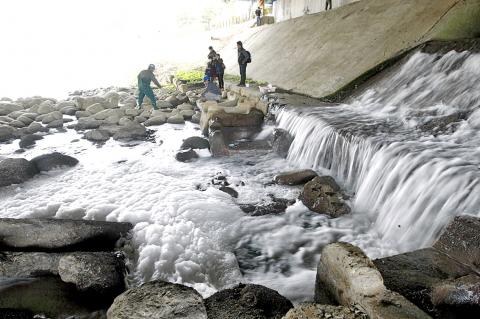The Taiwan High Court’s Kaohsiung branch yesterday reversed a lower court verdict, finding all five defendants in a 2013 pollution case involving Advanced Semiconductor Engineering Inc (ASE, 日月光半導體) not guilty on various charges related to discharging wastewater from the company’s K7 plant into the Houjing River (後勁溪).
The court acquitted four ASE executives and employees of all charges, including K7 plant general manager Su Ping-shou (蘇炳碩), plant wastewater section director Tsai Chi-hsun (蔡奇勳) and two wastewater section engineers — Yu Chih-hsien (游志賢) and Liu Wei-cheng (劉威呈).
Yesterday’s second ruling in the ongoing trial also cleared ASE of charges, meaning the company does not have to pay a NT$3 million (US$90,901) fine imposed by the Kaohsiung District Court in the first ruling on Oct. 20 last year.

Photo: Chang Chung-yi, Taipei Times
In the first ruling, the court found the four defendants guilty, but gave suspended sentences ranging from 16 months to 22 months, related to breaches of the Waste Disposal Act (廢棄物清理法).
Prosecutors appealed to the higher court at that time, saying the punishments were too lenient, as suspended sentences meant none of the defendants had to serve jail terms.
Another ASE K7 plant engineer, Ho Teng-yang (何登陽), who was found not guilty in last year’s ruling, had his verdict upheld by the high court.
ASE, said to be world’s largest IC packaging company, was accused of dumping industrial wastewater containing carcinogenic compounds and other toxic substances in the Houjing River after reports of discoloration and suspected pollution in October 2013.
Yesterday’s ruling was based on the judge’s belief that ASE had treated the wastewater and waste sludge differently, and that if any violations had occurred, they would be of the Water Pollution Control Act (水污染防治法).
The wastewater in question was not “hazardous industrial waste,” so the first ruling was wrong to have cited violations of the Waste Disposal Act (廢棄物清理法), yesterday’s ruling said.
The ruling said that Water Pollution Control Act laws regarding the discharge of toxic wastewater by businesses were only amended in February, and therefore a punishment cannot be meted out for a case from 2013.
The ruling also said that ASE employees had added extra amounts of alkaline liquid into wastewater to neutralize its acidity on the day pollution levels were recorded (Oct. 1, 2013), with pH levels shown to have returned to legal discharge standards by 8pm that night.
“Although there were shortcomings on that day’s processing and treatment of wastewater, it was not done deliberately, nor was it done in a haphazard way... Therefore, there were flaws in the first ruling,” it said.
It also said that prosecutors provided only one fish specimen and one sample from the riverbed as evidence of pollution, without presenting samples from other locations, or samples from preceding and subsequent times for comparison, adding that as reasonable doubt remains, the defendants should be acquitted of the charges.
The Kaohsiung District Prosecutors’ Office said it would decide whether to appeal the case after reviewing the ruling.

NATIONAL SECURITY THREAT: An official said that Guan Guan’s comments had gone beyond the threshold of free speech, as she advocated for the destruction of the ROC China-born media influencer Guan Guan’s (關關) residency permit has been revoked for repeatedly posting pro-China content that threatens national security, the National Immigration Agency said yesterday. Guan Guan has said many controversial things in her videos posted to Douyin (抖音), including “the red flag will soon be painted all over Taiwan” and “Taiwan is an inseparable part of China,” while expressing hope for expedited “reunification.” The agency received multiple reports alleging that Guan Guan had advocated for armed reunification last year. After investigating, the agency last month issued a notice requiring her to appear and account for her actions. Guan Guan appeared as required,

A strong cold air mass is expected to arrive tonight, bringing a change in weather and a drop in temperature, the Central Weather Administration (CWA) said. The coldest time would be early on Thursday morning, with temperatures in some areas dipping as low as 8°C, it said. Daytime highs yesterday were 22°C to 24°C in northern and eastern Taiwan, and about 25°C to 28°C in the central and southern regions, it said. However, nighttime lows would dip to about 15°C to 16°C in central and northern Taiwan as well as the northeast, and 17°C to 19°C elsewhere, it said. Tropical Storm Nokaen, currently

PAPERS, PLEASE: The gang exploited the high value of the passports, selling them at inflated prices to Chinese buyers, who would treat them as ‘invisibility cloaks’ The Yilan District Court has handed four members of a syndicate prison terms ranging from one year and two months to two years and two months for their involvement in a scheme to purchase Taiwanese passports and resell them abroad at a massive markup. A Chinese human smuggling syndicate purchased Taiwanese passports through local criminal networks, exploiting the passports’ visa-free travel privileges to turn a profit of more than 20 times the original price, the court said. Such criminal organizations enable people to impersonate Taiwanese when entering and exiting Taiwan and other countries, undermining social order and the credibility of the nation’s

‘SALAMI-SLICING’: Beijing’s ‘gray zone’ tactics around the Pratas Islands have been slowly intensifying, with the PLA testing Taiwan’s responses and limits, an expert said The Ministry of National Defense yesterday condemned an intrusion by a Chinese drone into the airspace of the Pratas Islands (Dongsha Islands, 東沙群島) as a serious disruption of regional peace. The ministry said it detected the Chinese surveillance and reconnaissance drone entering the southwestern parts of Taiwan’s air defense identification zone early yesterday, and it approached the Pratas Islands at 5:41am. The ministry said it immediately notified the garrison stationed in the area to enhance aerial surveillance and alert levels, and the drone was detected in the islands’ territorial airspace at 5:44am, maintaining an altitude outside the effective range of air-defense weaponry. Following